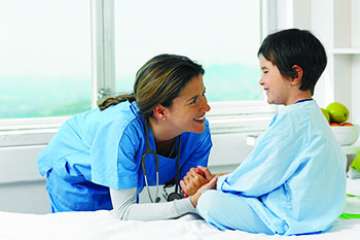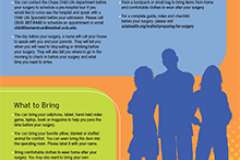Age-Appropriate Surgery Preparation Tips

At UCLA Mattel Children’s Hospital, we care for children of all ages. When it comes to preparing for surgery, a toddler and a teenager will have different needs. These tips will give you some guidelines for preparing your child, no matter what his/her age.
Preparing Infant and Toddlers for Surgery
For infants and toddlers, the disruption in routine is difficult. This is also the age when separation anxiety runs high. Here are some tips to consider:
- Keep the routine as consistent as you can, and bring familiar items from home to help your child feel safe.
- Toddlers are just beginning to understand what is happening but do not understand time, so do not give them too much time to ponder.
- Reassure your child that you will be there with him/her — and if you have to be away for a moment while the doctor helps him/her sleep with medicine, you will be right there waiting when he/she wakes up.
- Offer lots of extra “snuggle” time or “together” time with your child in the days leading up to the procedure. Your presence can help relieve anxiety.
Preparing Preschoolers for Surgery
The disruption in routine is tough for preschoolers as well. This is the age when “magical thinking” sets in, meaning that children link things that are not connected. For example, it is easy for preschoolers to develop misconceptions — that something they did caused the surgery. Try these tips for preschoolers:
- Encourage them to express their feelings, but reassure your preschooler that the surgery has nothing to do with his/her behavior.
- Preschoolers need a little more time to process than toddlers. Start talking to your child a week or so before the surgery. He/she will most likely be curious. Be honest, but keep explanations simple.
- Use play, tell stories or read books to help your child process the idea of surgery and give him/her the opportunity to ask questions.
Preparing School-Aged Children for Surgery
School-aged children tend to worry about time away from friends, school, sports and other activities. They will cope better with more knowledge about the surgery.
Here are some tips to consider:
- Unlike very young children, children this age need more time to prepare — at least one to two weeks. Give them concrete details about what will happen. Reassure them that there is a special doctor who gives them medicine so they will not feel any pain during the procedure.
- Try reading some books with your school-aged child. This is the age when he/she is learning about “research” for school projects and the value of information.
- They may be afraid to ask certain questions or have misconceptions about what will happen. Encourage your child to express his/her feelings, share worries and ask questions.
- Involving friends (such as making a plan for a friend to visit in the hospital) can ease your child’s mind.
Preparing Teenagers for Surgery

Teens have many of the same anxieties as grade school children, but these worries may be more intense. A teen might worry about losing independence and about how the surgery may affect his/her body. Download our Teen Surgery brochure.
Tips for teens include:
- Involve your teenager early on in the process and with the decision making. Make sure the teenager feels heard and has an equal voice in deciding what will happen.
- Be truthful. Teenagers deserve to understand the complexity of an issue. If they feel as though adults are lying to them, they may become angry or withdrawn.
- Teenagers need more space than younger children do. Respect their privacy, but encourage them to ask questions when they have them.
- Offer them a way to express their feelings. Suggest that they write, draw or compose (or whatever artistic form they prefer) as a way to share what they are feeling.
What to Read Next
Learn about what to do the day before your child’s surgery.